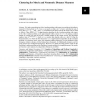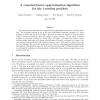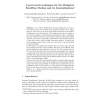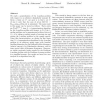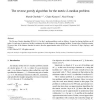132
Voted
TALG
2010
14 years 8 months ago
2010
We study a generalization of the k-median problem with respect to an arbitrary dissimilarity measure D. Given a finite set P of size n, our goal is to find a set C of size k such t...
135
click to vote
JCSS
2002
15 years 1 months ago
2002
We present the first constant-factor approximation algorithm for the metric k-median problem. The k-median problem is one of the most well-studied clustering problems, i.e., those...
109
click to vote
ESA
2010
Springer
15 years 3 months ago
2010
Springer
In a Content Distribution Network application, we have a set of servers and a set of clients to be connected to the servers. Often there are a few server types and a hard budget co...
134
click to vote
SODA
2008
ACM
15 years 3 months ago
2008
ACM
We study a generalization of the k-median problem with respect to an arbitrary dissimilarity measure D. Given a finite set P, our goal is to find a set C of size k such that the s...
108
click to vote
SODA
2008
ACM
15 years 3 months ago
2008
ACM
This paper studies an extension of the k-median problem where we are given a metric space (V, d) and not just one but m client sets {Si V }m i=1, and the goal is to open k facili...
133
Voted
STOC
1998
ACM
15 years 6 months ago
1998
ACM
In the k-median problem we are given a set S of n points in a metric space and a positive integer k. We desire to locate k medians in space, such that the sum of the distances fro...
MFCS
2001
Springer
15 years 6 months ago
2001
Springer
Abstract Marek Chrobak1 , Lawrence L. Larmore2 , and Wojciech Rytter3,4 1 Department of Computer Science, University of California Riverside, CA 92521 2 Department of Computer Scie...
118
click to vote
COCOON
2005
Springer
15 years 7 months ago
2005
Springer
The Reverse Greedy algorithm (RGREEDY) for the k-median problem works as follows. It starts by placing facilities on all nodes. At each step, it removes a facility to minimize the...
